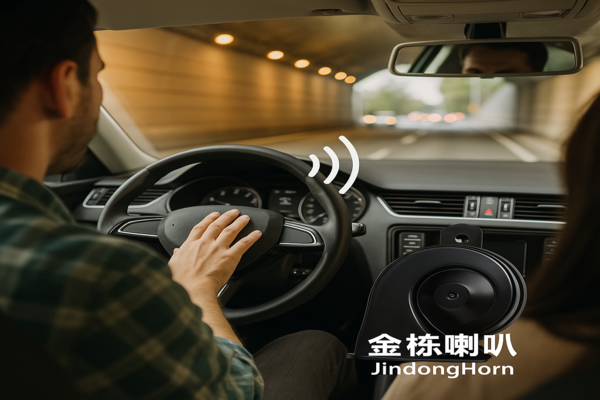Finding the right horn or knowing when to honk confusing? Wrong choices cause trouble; right info ensures safety and compliance. Get clarity now.
Yes, you can replace your car horn with a different one, provided it's compatible and meets local sound laws. Honking is legal only for necessary warnings, not casual use.
Understanding these points is key for anyone driving or involved in the auto parts business. As a manufacturer, we often get questions about customization and usage rules. Let's break down what you need to know, starting with swapping out your horn.
Can I put a different horn in my car?
Want a new sound from your car? Maybe louder? Worried if it's okay or will fit? Here’s the straightforward answer you need.
Absolutely, changing your car horn is possible. Just check the voltage (usually 12V), mounting space, and connection type. Most importantly, ensure the new horn's sound level and tone are legal in your area.
!
Replacing a car horn is a common task, either due to malfunction or a desire for a different sound. However, there are important factors to consider beyond just liking the noise. Let's dive deeper.
Key Considerations for Replacement
- Why Replace?
- Malfunction: The original horn might stop working or sound weak. This is a safety issue.
- Upgrade: Some drivers prefer a louder horn (within legal limits) or a different tone (e.g., a deeper sound from a trumpet horn instead of a standard disc horn).
- Compatibility:
- Voltage: Most cars use a 12V system. Ensure the replacement horn matches this. Trucks might use 24V.
- Mounting: Check if the new horn will physically fit in the space available and if the mounting brackets are compatible or adaptable.
- Connectors: Verify if the electrical connectors match or if adapters are needed.
- Types of Horns:
- Disc Horns: Compact, common in passenger cars, produce a sharper "beep" or "honk". We at FHL GBSY JS-TECH produce high-quality disc horns.
- Trumpet Horns: Larger, often louder with a more resonant tone. Found in larger vehicles or as aftermarket upgrades. We also manufacture these, ensuring durability.
- Legality - The Crucial Part:
- Sound Level (Decibels - dB): Most regions have laws limiting how loud a car horn can be. Exceeding this limit can result in fines. Check your local regulations. Our horns are designed to be effective but compliant.
- Tone/Sound Type: Horns that play melodies, imitate sirens, or make overly startling noises are generally illegal for standard vehicles. The sound should be a clear warning signal.
| Factor | Detail | Why It Matters |
|---|---|---|
| Voltage | Usually 12V for cars, 24V for trucks | Mismatch can damage horn or car |
| Mounting | Physical space, bracket compatibility | Needs to fit securely |
| Connectors | Electrical plug type | Needs to connect to car's wiring |
| Sound Level | Measured in dB, legal limits apply | Avoid fines, ensure road legality |
| Sound Type | Standard honk vs. illegal sounds | Must be a warning, not novelty/siren |
As manufacturers aiming for quality comparable to Bosch or Hella, we ensure our FHL GBSY JS-TECH horns meet standard fitment and performance criteria, offering reliability for wholesalers and distributors targeting markets like Southeast Asia or Europe where compliance is key.
Why is honking your horn illegal?
Frustrated by constant, needless honking on the road? Wonder exactly when using your horn crosses the line into illegal? Let's clear up the confusion.
Honking isn't always illegal, but its purpose is restricted. Use it only to warn of immediate danger. Unnecessary honking (anger, greetings, in quiet zones) is illegal due to noise and distraction.

The car horn is fundamentally a safety device. Its misuse can be annoying and, more importantly, against the law in many situations. Let's look at the specifics.
The Legal Use vs. Illegal Use
The primary legal function of a car horn is collision avoidance. You are generally permitted (and sometimes required) to honk when:
- You need to alert a driver or pedestrian of imminent danger (e.g., they are drifting into your lane, stepping out without looking).
- You are rounding a blind curve on a narrow road where visibility is limited.
However, using your horn in other situations is often illegal and considered improper: - Expressing Anger/Frustration: Honking because someone cut you off, is driving too slowly, or didn't move immediately when the light turned green is usually illegal (and contributes to road rage).
- Greeting Someone: Using your horn to say hello or goodbye to a friend.
- Demanding Right-of-Way: Trying to pressure other drivers to move out of your way when there's no danger.
- In Designated Quiet Zones: Near hospitals, schools, or in residential areas during specific hours (e.g., late at night), honking may be prohibited unless absolutely necessary for safety. Many countries in Europe have strict rules about this.
- Showing Off: Using custom horns improperly.
Consequences and Context
Penalties for improper horn use vary by location but can include fines and potentially points on your driving license. Beyond legality, unnecessary honking contributes to noise pollution and can be stressful or startling to others. I remember visiting Manila once, and while honking seemed more common culturally, there were still underlying rules about necessary use. For our clients like Jeremy in the Philippines, supplying reliable horns is important, but end-users must still understand the local regulations for using them appropriately. A quality horn from FHL GBSY JS-TECH works perfectly when needed for safety – its misuse is down to the driver.
Is it illegal to have a train horn on your car?
Tempted by those super loud train horns? Seen them on trucks and wondered if you can put one on your car? This could lead to serious trouble.
Yes, putting a train horn on a regular passenger car is almost universally illegal. They are excessively loud, violate noise regulations, and can dangerously startle other drivers, pedestrians, and animals.

Train horns are designed for locomotives and are significantly different from standard automotive horns. Installing one on your car might seem fun or cool to some, but it comes with major legal and safety risks.
Why Train Horns are Prohibited on Cars
- Extreme Loudness: Train horns operate at very high decibel levels (often 130-150 dB or more). This far exceeds the legal limits set for passenger vehicles in virtually all countries (typically around 110-120 dB max). Such extreme noise can cause hearing damage and is considered severe noise pollution.
- Safety Hazard: The sheer volume can startle other drivers intensely, potentially causing them to lose control of their vehicle or react unpredictably, leading to accidents. It can also frighten pedestrians and animals near the road.
- Confusion with Emergency Signals: While not identical, the extreme loudness can sometimes be mistaken for emergency vehicle sirens or actual train warnings, causing confusion.
- Regulatory Compliance: Vehicle safety standards (like DOT in the US or ECE in Europe) specify requirements for horns, including sound levels. Train horns do not meet these standards for road vehicles. Our FHL GBSY JS-TECH horns are manufactured to meet these international standards, ensuring legality.
Penalties and Our Stance
Installing and using a train horn on a car can lead to significant penalties, including:
- Large fines.
- Vehicle being ordered off the road until the horn is removed.
- Possible vehicle impoundment in some areas.
As a responsible manufacturer focused on quality and compliance, we do not produce or recommend train horns for passenger cars. Our goal is to provide distributors and wholesalers with high-quality, legal, and effective automotive horns suitable for everyday road use, meeting the needs of markets that value safety and adherence to regulations.
| Feature | Standard Car Horn (e.g., FHL Disc/Trumpet) | Train Horn |
|---|---|---|
| Power Source | Typically 12V Electric | Usually Air Compressor (Pneumatic) |
| Sound Level | 100-120 dB (approx.) | 130-150+ dB |
| Legality (Car) | Legal (if meeting local dB limits) | Illegal |
| Primary Use | Road vehicle warning signal | Train warning signal |
| Safety | Designed for road safety | Dangerous/Startling on road |
Conclusion
You can change car horns legally if compatible and compliant. Only honk for safety warnings; unnecessary use is often illegal. Train horns are definitely illegal on cars. Choose quality, legal horns.

